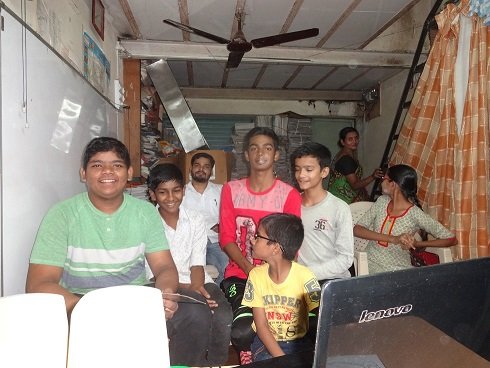One of the most vital concerns we raise amongst ourselves from time to time is about the number of children we actually reach and the extent to which we reach them. It is even a criticism levelled at the initiative by some professionals as well as members of the lay public. And to a certain extent, it is a valid criticism.
After all, we have no control over who actually sits in on a Granny session. Nor can we really stop disinterested children from getting up and going away mid-session. Kind of difficult considering that we aren’t ANYWHERE NEARBY! And that is an understatement.
There is no curriculum, no ‘assessment’, no teaching, not even necessarily a session plan! And if there is occasionally a plan, it is, more often than not, tossed aside by circumstances (typically connectivity challenges) or because the children would rather do something else.
Yet if one looks at the real gains, it is a different story. The fact that it is ‘child driven’ (not even just ‘child centred’) allows the children to take ownership of their learning. The fact that they can choose what interests to follow bolsters their confidence and ensures that they are truly motivated to learn. That they learn to search, and reflect on the information they gather, and question it, are abilities that any educator worth his or her salt would treasure. That this begins to translate into their everyday life and impact them as citizens, is a gain I hold particularly dear.
I see these changes happening – softly, gradually, sometimes going unnoticed. But they show up in the reports of the Grannies and the coordinators. I see these changes when I observe the children during a centre visit.
But there is still the question of numbers.
After all, how many do we really “reach”? How many have we reached over the years? Is it really worth it? Especially when we don’t know for sure….
But for change to happen, one has to believe. It would be simple to take the easiest way out and say – “We don’t reach enough children. How much time do we actually get with an individual child? We don’t know for sure what difference we make in the children’s lives. We are just volunteers. We have no organizational backing. We don’t have enough Grannies to reach out to all the centres. There is no guarantee that the centres will continue to operate. ”
Yet my belief just grows stronger with every passing year. The first children that used the SOLEs and interacted with The Granny Cloud in India are “growing up”. Several of them are about to finish college and enter professional life. Yet others have stayed in touch even though their encounter with The Granny Cloud was relatively brief. But when they share what is going on in their lives today, they perceive the impact of that experience on what they choose to do and what they are.
That would be enough for me. After all, as one person or one small group of volunteers it is very heartening to know that you have made a difference in someone’s life.
But it doesn’t stop there. What really does it for me (and I suspect for many others in the Granny Cloud team) is the change that is wrought in their way of thinking, of the responsibility they feel towards others around them, of the role they think they should be playing vis-a-vis the environment, and the world around them. With one child living in a ‘vasti’ it translates into a children’s campaign to ‘not play Holi because of the shortage of water’, with others to stir other children to independent study and discovery with just a light, supportive touch (the way they have observed the Grannies do it!). And with yet others it translates into an urge to grow up and reach out to children, still in the same situation as they were a few years earlier.
These are children from disadvantaged settings. Even the schools they go to typically have minimal resources (personal as well as material). But they have made the most of the opportunities that became available to them. It is the old story about the star thrower on the beach throwing starfish back into the sea – one by one. Yes, it might not make a huge difference in the world – not yet anyway. But it does change the life of that one child.
And you know what clinches the matter for me? The possibility that these children [grown up] will be in position from where they can make their own impact – as professionals as parents, as citizens. That they will be able to change our educational system, our work ethics, indeed – our society – for the better. Perhaps, just perhaps, a few of them will be in positions of authority from where they can guide policy, and be in executive positions from where they can implement that policy. Just a handful? Yes – but it could mean a really big difference. And who knows, perhaps those of us who work in more advantaged settings, and come from more privileged homes will also someday see the value in enabling all children to think for themselves, to question what they see around them, to discover and arrive at conclusions based on scientific evidence, and to act in rational ways. And perhaps they will use the strategies and the orientation of the SOLEs and The Granny Cloud with the children they are in touch with. THAT could reach a very large number and have a massive impact – all at once…
Till then, for us in The Granny Cloud, it is – one centre – one child – one day at a time…

